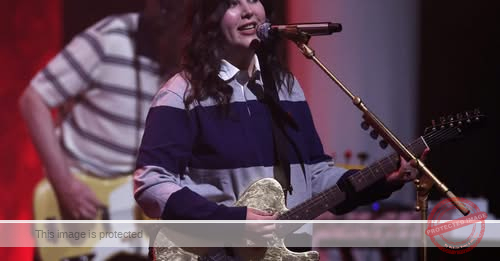
Lucy Dacus had love on her mind Thursday at the first of a sold-out two-night stand at the Chicago Theatre. The singer-songwriter met the messiness and complexities of the emotion head-on. Her narratives addressed obsessive infatuation, speculative wonder, carnal bliss, honeymoon periods, in-between phases, bitter contradictions and all the euphoria, torment and confusion that serious affection often involves.
An old soul who admitted she’s been old since she was born, Dacus spent the last day of her 20s — she celebrates a birthday on Friday — chronicling relationship issues that seemed extremely personal and making them relatable to strangers who held their collective breath for quiet moments. They enjoyed plenty of opportunities. Polite to a fault, the 90-minute concert rarely saw Dacus take risks or depart from a charted course.
Backed by an adequate five-piece band, Dacus primarily adhered to the mild, rounded sonic profile of her new “Forever Is a Feeling” LP. Tracks from the album comprised the majority of the 19-song set. That the Boygenius member seldom increased the temperature and opted for tame approaches to tunes that burned with poetic passion felt like a missed opportunity to spark material that, on record, suffers from the same odd disconnect.
For all her low-key charm and aw-shucks modesty, Dacus didn’t do herself any favors sitting down at several junctures, or when instrumentalists in her group followed suit. During a stripped-down segment, Dacus sipped tea and got comfortable on furniture that resembled theater props in a play set in a royal palace. Keeping body language to a minimum, she mainly remained stationary. And while Dacus engaged in small talk and offered gratitude, anyone hoping for insight into her romance with fellow Boygenius bandmate Julien Baker left empty-handed.
Coincidentally, Dacus’ Christian upbringing and origins as a professional musician share similarities to Baker’s background. Growing up as an adopted child in a suburb of Richmond, Virginia, Dacus attended church camp and found herself surrounded by religious songs. Her religious faith ultimately evolved. Dacus came out as queer at the age of 19, around the time she dropped out of college.
Dacus worked at a photo lab and continued to write songs, a habit that started more than a decade earlier. A friend asked her to record some for part of his school project. Less than 24 hours of work at a Nashville studio with an ad-hoc band resulted in her 2016 debut “No Burden.” It received rave reviews and attracted a feeding frenzy of labels.
After signing with Matador Records, Dacus experienced a whirlwind ascension. Her second album, “Historian” (2018), enjoyed considerable acclaim. A few months later, Boygenius issued its debut EP. Dacus kept gigging and creating, releasing an EP of holiday-themed fare in 2019 and a third celebrated full-length (“Home Video”) in 2021.
That building momentum, coupled with that generated by Baker and Phoebe Bridgers’ solo careers, culminated in the success of Boygenius’ “The Record” (2023). Nominated for seven Grammys, it affirmed the trio’s mainstream status and influential standing amid a culture reverting back to conservative ideas of women’s place in society. Having assumed prior positions in favor of abortion and transgender rights, Dacus upped the protest ante on Boygenius’ tour by performing in drag and calling President Obama a “war criminal” on Twitter.
Controversies aside, she could’ve used more bite and tension on Thursday. Or at least some rough edges to tear at the fabric of formal, delicate arrangements underpinned by washed-out keyboards, restrained guitars and violins. A hushed stillness and atmospheric glaze floated atop a host of light, leisurely paced songs. The inquisitive “Modigliani” evaporated into thin air. A sorrowful “Big Deal” never dared to rise above a whisper. The maudlin “Best Guess” ambled its way into easy-listening territory. Chamber-pop flourishes on “Ankles” — which referenced sexual desires without resorting to cheap, explicit language — suffocated Dacus’ understated vocals.
Warm, transparent, soft, controlled, a touch smoky: Dacus’ medium-low vocal register emerged as a continual strength. Whether crooning, sighing, pleading or apologizing, she treated phrases as personal disclosures that deserved close inspection. Escaping to a private world for the piano ballad “Limerence,” Dacus expressed uneasy thoughts while seated on a small riser. She looked as if she had fled the commotion of a house party, made her way to the roof and bared her soul to the moon. Amid the country jangle and radiant hooks of “Most Wanted Man,” Dacus navigated the disbelief of her good fortune and delivered the equivalent of an engagement proposal with disarming sincerity.
The acoustic-based portion further highlighted Dacus’ interpretive skills. She scaled “I Don’t Wanna Be Funny Anymore” back to an acoustic foundation and layered her deceptively casual vocals over a rubbery riff. On a gently strummed “For Keeps,” she sang the final couplet with measured slowness and lethal finality. When a microphone wielded by special guest Julia Steiner (singer for the Chicago indie-rock group Ratboys) failed to operate on a duet of “Bullseye,” Dacus shared hers and picked up the slack.
Having displayed visual signs on certain songs (“Talk,” “VBS”) of wanting to rock only to be thwarted by muted distortion and one-and-done sequences, Dacus’ quintet finally broke through on the coda to “Lost Time.” Punchy and emphatic, the layered section illustrated the dynamics and liveliness missing from much of the other material. Relatedly, during the encore, a rendition of Boygenius’ “True Blue” burst with welcome textures and toughness. Along with the amplified spasms of the closing “Night Shift,” it drew by far the most enthusiastic reaction of the evening.
A high-note exit to an otherwise moderate performance, and an indication that next time through, Dacus needs to inject more hot blood into the heavy memories.
